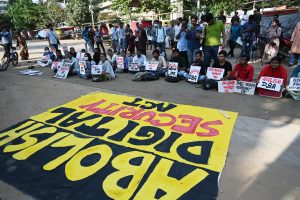Khadijatul Kubra, a student at Jagannath University, once dreamed of a future shaped by the power of open dialogue and free expression. But those dreams were shattered when an online interview she conducted with a retired expatriate army officer drew the ire of the Bangladeshi government. The officer’s criticism of the administration landed Kubra in prison under the draconian Digital Security Act. For nearly 16 months, her academic journey was derailed, her freedom stripped away, and her voice silenced.
Kubra’s ordeal is not an isolated case. She is one of over a thousand citizens, journalists, and politicians who fell victim to oppressive laws like the Information and Communication Technology Act, the Digital Security Act, and the Cyber Security Act during Sheikh Hasina’s 15-year tenure as Bangladeshi prime minister. These laws suffocated free speech and created a climate of fear, eroding the foundations of Bangladesh’s democracy.
In the wake of Bangladesh’s July uprising, where citizens reclaimed their lost right to free speech, the interim government led by Dr. Muhammad Yunus promised to uphold democratic values and human rights.
However, the draft Cyber Security Ordinance, recently approved in principle by the Advisory Council, has raised serious concerns. It not only mirrors the repressive legal frameworks of previous administrations but also threatens to undermine the progress made toward a more open and democratic society.
The draft ordinance was approved without the involvement of all relevant stakeholders or adequate public discussion. This approach to drafting legislation is reminiscent of the authoritarian practices of Sheikh Hasina’s Awami League government. The lack of transparency is troubling, particularly from an interim government that pledged to engage in inclusive governance.
Adding to the opacity, a special adviser assisting the Honorable Advisor of the Ministry of Information and Technology shared controversial provisions of the ordinance on social media through a personal account, even before its official approval and publication. This bypassed official channels for public disclosure and has sparked widespread discontent among stakeholders. Such unprofessional conduct demands accountability and raises questions about the government’s commitment to transparency.
The draft Cyber Security Ordinance offers little substantive difference from the repealed Digital Security Act, aside from minor changes and reduced penalties. Alarmingly, Subsections 1 and 2 of Section 8 grant the Director General of the National Cyber Security Agency unilateral authority to remove or block any information deemed a threat to national solidarity, security, defense, religious values, or public order. This centralized power creates a significant risk of discriminatory practices and abuse of authority to suppress dissent.
Moreover, the ordinance suggests that state law enforcement and government officials will now define and adjudicate matters of national solidarity and religious values. This effectively mirrors the oppressive legal frameworks of past regimes, offering little meaningful change in terms of safeguarding citizens’ rights.
The National Cyber Security Council, as outlined in the draft, remains dominated by government ministers, bureaucrats, and law enforcement officials. Provisions for warrantless arrests and the continuation of unresolved cases under the Digital Security Act and Cyber Security Act further perpetuate the repressive nature of prior laws.
Key definitions are conspicuously absent from the draft, leaving critical issues open to interpretation. For example, the ordinance fails to clearly define types of cybercrimes, online sexual harassment, cyberbullying, online grooming, and personal data. Furthermore, important aspects such as the non-liability of service providers, clear criteria for recognizing experts, and a comprehensive cybersecurity framework are missing. This lack of clarity could lead to arbitrary enforcement and legal uncertainty.
The drafters of the ordinance have conflated three distinct areas: cybersecurity, cybercrime, and content moderation. This conflation results in a confusing and misleading draft that lacks coherence and fails to address the specific needs of each domain. By blurring these boundaries, the ordinance risks creating more problems than it solves, potentially stifling innovation and legitimate online activity.
The draft ordinance also fails to align with recent global developments and best practices. It overlooks key frameworks such as the Global Digital Compact (GDC), announced at the United Nations Summit of the Future on September 22, and the United Nations Convention against Cybercrime, adopted by the General Assembly on December 24 last year. By ignoring these critical international standards, the ordinance risks isolating Bangladesh from the global digital community and undermining its commitment to democratic values.
The interim government has a unique opportunity to steer Bangladesh toward a more democratic and inclusive future. However, the current draft of the Cyber Security Ordinance risks squandering this potential by perpetuating the oppressive practices of the past. By engaging in transparent, inclusive, and accountable lawmaking, the government can uphold the democratic ideals for which the people of Bangladesh have fought so hard. Anything less would be a betrayal of their sacrifices and a step backward for the nation’s democratic progress.
































